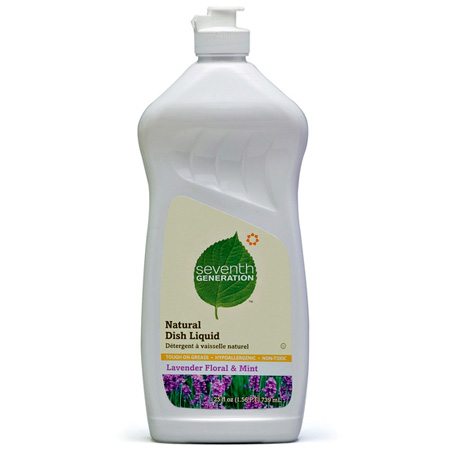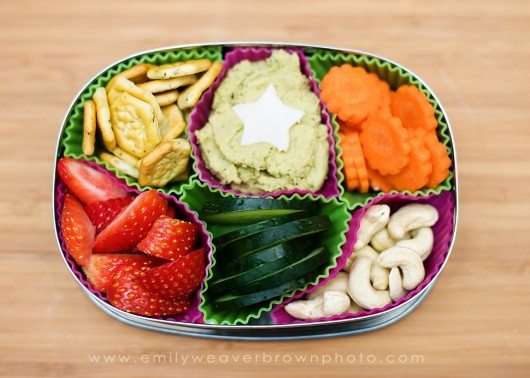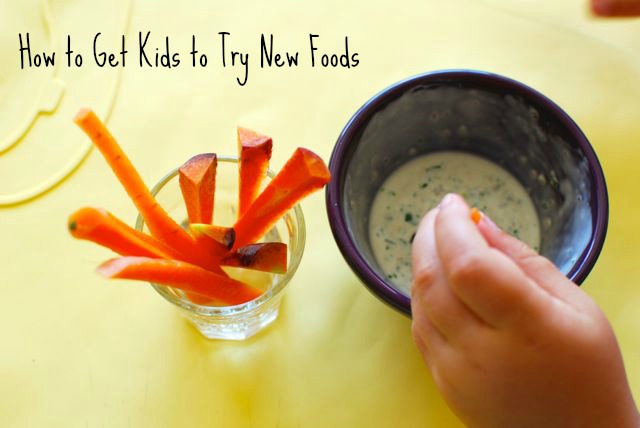My New Year’s Resolution for 2011 is to produce less household waste. I’m already pretty eco-conscious, but there’s always more we can do to reduce our impact on the planet, right? One good place to begin this challenge is in the kitchen. A few simple swaps and a little thinking ahead can greatly reduce the amount of trash you produce. Here are some easy ways to get started:
1. Switch to eco-friendly kitchen cleaning products.
- Dish soap: My faves are Seventh Generation and Mrs. Meyer’s (both available on the cheap at Target).
- Dishwasher soap: Try Trader Joe’s Environmentally Sound Automatic Dishwashing Detergent — it cleans more effectively than even the regular brands and is inexpensive.
- Scrubbing: I use Bon Ami’s gentle scrub — its the eco-friendly version of Comet, and works just as well.
- Cleaning the counters: I just use warm water with dish soap, but if you’re into sprays and cleaners, try Ecos Orange Plus, or Seventh Generation All-Purpose Cleaner.
2. Stock up on reusable bags. Many of us are already toting reusable grocery bags, but there are also reusable produce bags, cloth bags for bulk-bin items (like flour, rice), and reusable pouches for sandwiches and snacks on-the-go.
- Grocery bags: These are my favorite grocery bags because they condense into a tiny pouch that you can keep in your purse or glove compartment, so you’ll never forget your bags again.
- Produce bags: EcoBags makes a great one, and there are many sold at Whole Foods and other natural markets that will prevent you from having to use the plastic ones in the produce section.
- Bulk item bags: When you’re bagging up flour, oatmeal, or lentils, you want something that won’t leak or break. Mason jars are great if your market can accurately weigh your items, or look for burlap/fine mesh bags.
- Food storage bags: Since Ziploc and other plastic bags NEVER biodegrade, try storing food in biodegradable zip bags by Green Genius. If you can’t find them in a store near you, they’re available on Amazon (they’re out right now, but they’ll be back).
- Sandwich & snack bags: These and many other options available on Amazon.
- Trash bags: I like Green Genius — they’re not reusable, but they are biodegradable, super-strong, and they cost about the same as regular trash bags.
3. Make the most of your appliances. Stick to one method of cooking per meal. If you’re grilling, grill everything. If you’re baking, bake or roast everything. When reheating or making something small, use the toaster oven or microwave, which are energy-efficient.
4. Plan meals around in-season veggies and fruits. You can greatly reduce your carbon footprint, not to mention save a ton of money, if you eat what’s in season much of the time. Use this guide to see what’s in season in your area at any given time. The bonus is everything you eat will taste better!
5. Make a plan and a list before heading to the grocery store. If you head to the grocery store blindly, you’ll be more likely to over-buy, which means you’ll have more food waste. Reducing food waste is one of the biggest ways you can make a difference in your kitchen. Use these tips for effective food planning and shopping.
6. Start composting. If you have a yard or a deck/patio in the shade, you can reduce the amount of trash you throw away by a HUGE percentage if you compost food waste. Some cities have composting programs where all you have to do is request a bin. If you’re not in one of those cities, check out these composting basics and get started.
7. See what your local recycling program is accepting by looking online about every 6 months, so you’re up-to-date on what can be recycled in your area. (Programs often change — just a few years ago #5 plastic, which is what many containers and lids are made of, wasn’t recyclable in many areas, but now it is). Remember, only clean, unsoiled items are recyclable…so wash out that yogurt container or peanut butter jar before dumping in the recycle bin.
Still hungry for more info? Here are some more ways to be an eco-friendly cook.







1 Comment